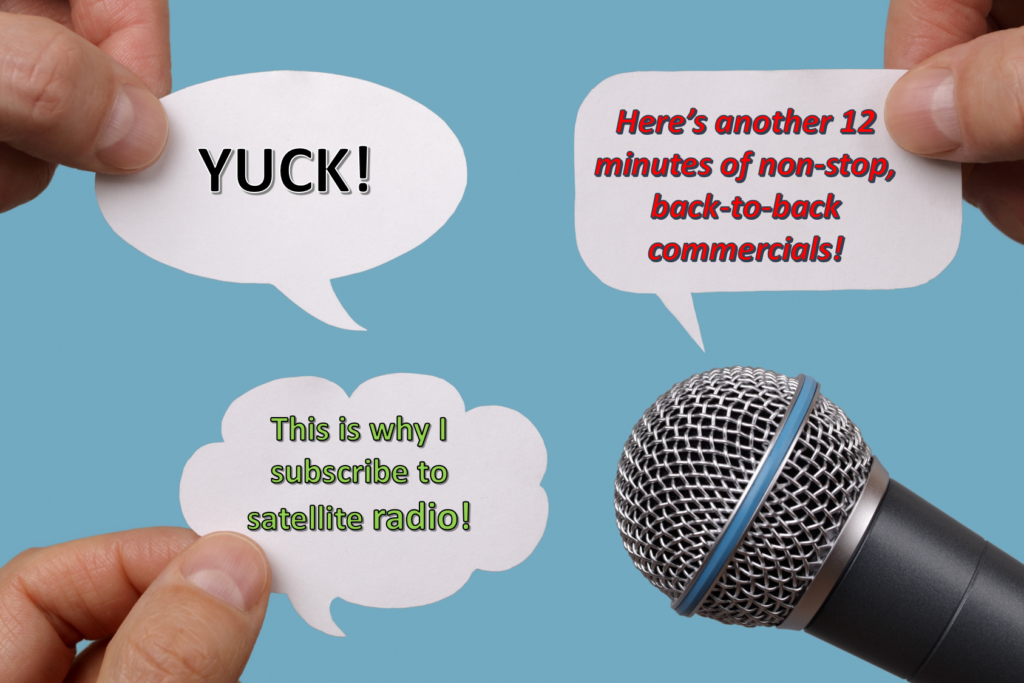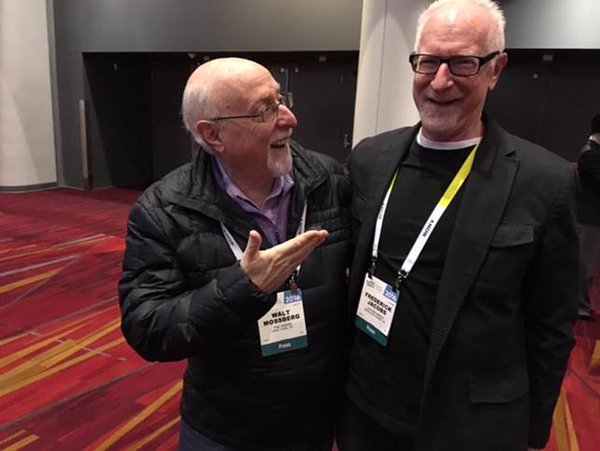
The era of the PPM ratings methodology has taught programmers about the value of minute-by-minute programming. Meters can migrate on a dime, reacting to everything from a rambling DJ to poor encoding to a weak-testing song.
Yet, why does everyone seemingly ignore the 25 minutes of commercials they run every hour?
A couple weeks ago, ad copywriter savant, Kevin Gunn, from Beasley’s WMMR, provided a template for writing better radio copy. And down the street in Philly, Jerry Lee has been on a one-man mission for years to cajole and beg radio to raise its creative commercial game. From better results to longer listening spans, there are compelling reasons for radio to invest in its stopset strategy.
And now there’s one more reason:
Web advertising is abysmal – and getting worse.
That reality came into focus last week when Walt Mossberg, tech guru from Recode, wrote a pointed story about the web advertising experience:
“Lousy ads are ruining the online experience.”
Mossberg recounted his bumpy online experience while trying to simply watch an NFL playoff game replay. It’s an experience that we all share every time we’re surfing around the web. It’s a lot of things: forced ads that automatically run, long pre-rolls, incessant buffering, trying to fool us into clicking the wrong link. Mossberg’s point is that web advertising has become a minefield.
How many of us have simply given up by x-ing out a web page because it was simply unnavigable? It seems like every time you click on “The 10 Least Expensive Cities In America” or “The 12 Colleges With The Best ROI,” the experience is so fraught with speed bumps and glitches that you just throw in the towel – or mouse.
Mossberg cites the recent move by Ev Williams, CEO of Medium, who recently canned his entire ad sales team. And while Williams may end up moving to a subscription model to eliminate the manic, cacophonous, and intrusive web experience, the fact is that when it comes to advertising, the Internet is broken.
That’s summed up by Scott Cunningham, SVP Technology and Ad Operations for the Interactive Advertising Bureau:
“We lost track of the user experience. Looking back now, our scraping of dimes may have cost us dollars in consumer loyalty.”
Doesn’t that statement ring true in the radio business, too? As big radio companies fell deeper into debt, programmatic and remnant ads have become the norm, driving the commercial experience down the drain, making stopsets virtually unlistenable. The quest for revenue – any revenue – has created the worst possible environment for radio’s two biggest constituencies – advertisers and listeners.

There are so many different players intertwined together on the web that Mossberg all but suggests that aside from subscription models, the experience may not be fixable. And given that so many of radio’s traditional spenders have moved to digital spaces, that’s a story that sales departments should be sharing with clients. When the IAB raises doubts about the efficacy of online advertising, you’ve got a problem on your hands.
Radio, as an industry, may actually be in a position to take control of its own substandard advertising experience. Unlike the catacomb-like nature of the Internet, the radio advertising ecosystem is smaller, tighter, and more like a small community than a global morass of vendors, third party players, and scam artists all trying to game the system.
Initiatives from the RAB and pioneers like Jerry Lee could actually improve the on-air advertising experience, at least a few times an hour. If that turned into more sales success stories and improved listening duration, isn’t that an initiative worth pursuing?
In recent years, radio has had its hands full competing with Internet ad models.
By improving its advertising experience, its old-school solution could become fashionable again.
- What To Do If Your Radio Station Goes Through A Midlife Crisis - April 25, 2025
- A 2020 Lesson?It Could All Be Gone In A Flash - April 24, 2025
- How AI Can Give Radio Personalities More…PERSONALITY - April 23, 2025




Dear Fred, I never got into radio as a young person thinking I would be making commercials – radio was my music connection. When I found myself MD in Los Angeles I was set for life, that is until a sale and format change upended it all. But guess what? I’m still in the business I love, and making entertaining spots, working with pro-tools every day, and using creative energy – this is not typical 9 to 5. No excuses not to use your imagination and have fun with radio – it remains the theatre of the mind. Internet ads had better understand their potential. Great column.
Marylee, career paths often work in strange, unplanned ways. Thanks for the observations and reminding us that the stuff “in between the records” can have an entertainment value and energy all its own. Appreciate the comment.
I read this blog with great interest. If you have creative minds on staff introduce them to your clients. Let them write and produce, as a team, fun to listen to and effective commercials and play them for the sponsors. See if they want creative pieces. I have worked for a few stations that brought the staff together and had them exercise all of their creative abilities. It was empowering to be challenged to write and act in a creative commercial with other staff members. The audience will appreciate and enjoy the effort to make each element entertaining……and they might stick around longer.
It’s a process because not every client (sadly) appreciates strong production and creative. You’re correct that with the right staff and a little time (and in some cases, there’s the rub), they can collectively do a better job. Thanks for the comment, Dan.
Fred:
How about talking with some actual radio sales managers about this?
See what kind of response you get. I’d be interested. Because as a guy in the trenches…it’s the same thing. “Just keep pumping out those spots and who cares what they sound like as long as they run as logged.”
Honestly, there are companies who try to do better. But when the client wants crap, crap is what they get.
Kevin, I appreciate the response. I think that in the main, sales managers would tell you they’d love to have higher quality spots but budgets often prohibit hiring enough talent to make that happen. And yes, you are also correct that there’s a percentage of clients who don’t care or don’t the difference. You’re not going to “fix” all the commercials in a stopset, but if you could make a percentage of them better, it’s a start. Thanks for the comment.
Where do we start with this one ? Once (in the 90s) our company was trying to build its own traffic scheduling/billing system. I was in one of the meetings and asked why we couldn’t include “quality” as part of that scheduling. The room got very quiet. We had already had experience in working with music scheduling software that addressed a lot of those issues-why not spots ? Almost 30 years later, we’re still stuck in the same old conundrum. It’s being enhanced by increasing unit counts, more interns (it happens in a lot of markets) voicing spots and the terrible ad insertion software for online streaming. There are still huge numbers of up and coming performers who will work for hours on creating a worthy performance for an audience. Radio still has the opportunity of being that same kind of “theater” -only these people can create hundreds of teeny tiny little “productions” that can not only sell the product, but entertain the audience. There is a fine line between “making the sale” and “serving the client”. We too often in radio address the former. When you think radio commercials one name should come to mind. Dick Orkin.
Dave, thanks for the observations and the insights. Radio is a great medium for sales and marketing, but most station staffers would tell you the challenge revolves around a lack of resources – human and time. The potential is there, of course, but a more concerted effort is necessary if radio is to make inroads here. Thanks again.
Years ago, a production director uttered these words to me, and at the time I had no idea how poignant they were, “The production director is the most undervalued position at a radio station.” Yea, unfortunately he or she is often seen as just a sausage maker. Here comes another 23 minutes of sausages.
That’s a true statement, John. I might also add the traffic director, another difficult, thankless job that is essential to a station’s success. Thanks for commenting.